
The Lithuanian Soviet Socialist Republic, also known as Soviet Lithuania or simply Lithuania, was de facto one of the constituent republics of the Soviet Union between 1940–1941 and 1944–1990. After 1946, its territory and borders mirrored those of today's Republic of Lithuania, with the exception of minor adjustments to its border with Belarus.
The Social Democratic Party of Lithuania is a centre-left and social democratic political party in Lithuania. Founded as an underground Marxist organisation in 1896, it is the oldest extant party in Lithuania. During the time of the Soviet Union, the party went into exile, emerging once again after the end of communist rule in 1989.
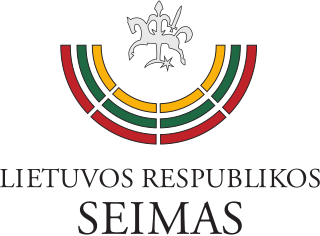
The Seimas of the Republic of Lithuania, or simply the Seimas, is the unicameral legislative body of the Republic of Lithuania. The Seimas constitutes the legislative branch of government in Lithuania, enacting laws and amendments to the Constitution, passing the budget, confirming the Prime Minister and the Government and controlling their activities.
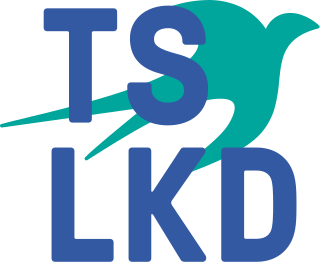
The Homeland Union – Lithuanian Christian Democrats, also colloquially known as the Conservatives, is a centre-right political party in Lithuania. It has 18,000 members and 28 of 141 seats in the Seimas. Its current interim leader is Radvilė Morkūnaitė-Mikulėnienė following the resignation of Gabrielius Landsbergis in 2024 after the party's loss in the election. It is a member of the European People's Party (EPP) and the International Democracy Union (IDU).

The Labour Party is a populist centre-left political party in Lithuania. The party was founded in 2003 by the Russian-born millionaire businessman and member of Seimas Viktor Uspaskich.

The Lithuanian Farmers and Greens Union is a green-conservative and agrarian political party in Lithuania led by Ramūnas Karbauskis. The party is considered one of the main representatives of the left wing of Lithuanian politics. Lithuanian journalist Virgis Valentinavičius described the party as "the mixture of the extreme left in economic matters and the extreme right in some social issues, all spiced up with an anti-establishment rhetoric of radical change".

The Democratic Labour Party of Lithuania was a political party in Lithuania. It was the successor of the Soviet-era Communist Party of Lithuania. The youth organization of LDDP was called Lithuanian Labourist Youth Union.
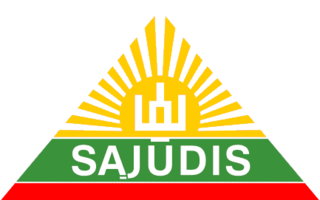
The Sąjūdis, initially known as the Reform Movement of Lithuania, is a political organisation which led the struggle for Lithuanian independence in the late 1980s and early 1990s. It was established on 3 June 1988 as the first opposition party in Soviet Lithuania, and was led by Vytautas Landsbergis. Its goal was to seek the return of independent status for Lithuania.
The People's Seimas was a puppet legislature organized in order to give legal sanction the occupation and annexation of Lithuania by the Soviet Union. After the Soviet ultimatum in June 1940, a new pro-Soviet government was formed, known as the People's Government. The new government dismissed the Fourth Seimas and announced elections to the People's Seimas. The elections were heavily rigged, and resulted in a chamber composed entirely of Communists and Communist sympathizers. The new parliament unanimously adopted a resolution proclaiming the Lithuanian Soviet Socialist Republic and petitioned for admission to the Soviet Union as a constituent republic. The Supreme Soviet of the USSR accepted the Lithuanian petition on 3 August 1940. The People's Seimas adopted a new constitution, a close copy of the 1936 Soviet Constitution, on 25 August and renamed itself to the Supreme Soviet of the Lithuanian SSR.

The Lithuanian Democratic Party was a political party in Lithuania. The original party was established in 1902. It published newspapers Lietuvos ūkininkas (1905–1918) and Lietuvos žinios (1909–1915). During World War I, the party split into several other parties and was disbanded in 1920. A new party under the same name was established in 1989.

The Socialist Party of Lithuania was a left-wing political party in Lithuania. It was founded on March 26, 1994, and briefly had a Member of the Seimas in 1996. It did not achieve any success in elections and merged with the Front Party in 2009 to form the Socialist People's Front.

The National Resurrection Party was a short-lived political party in Lithuania. In the 2008 Lithuanian parliamentary election, it became one of the largest parties in the Tenth Seimas of Lithuania, but quickly lost popularity, disintegrated and merged with the Liberal and Centre Union in 2011.

Parliamentary elections were held in Lithuania on 8 October 2000. All 141 seats in the Seimas were up for election, 71 of them in single-seat constituencies based on first-past-the-post voting; the remaining 70, in a nationwide constituency based on proportional representation. Altogether, around 700 candidates competed in the single-seat constituencies, while over 1,100 candidates were included in the electoral lists for the nationwide constituency.

The Socialist People's Front is a left-wing political association in Lithuania formed in December 19, 2009, from a merger of the Front Party and Lithuanian Socialist Party. Held at Vilnius University, the party's foundation featured 102 delegates. The merger was approved by an affirmative vote of 96 delegates, with three against and one abstaining. The leader of the Lithuanian Socialist Party, Giedrius Petružis, refused candidacy for chairperson of the merged party, claiming a desire to return to academic life. The leader of the Front Party, Algirdas Paleckis, was unanimously chosen as the leader of the SPF.
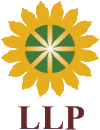
The Lithuanian People's Party is a minor pro-Russian political party in Lithuania. It describes itself as left-of-centre. It was founded in 2010 as a split from the Lithuanian Peasant Popular Union, and was led by the party's former chairman and the first prime minister of independent Lithuania, Kazimira Prunskienė. It has no representatives on the European, national or municipal level.

Algirdas Paleckis is a Lithuanian diplomat, politician, columnist, leader of the political movement The Dawn of Justice. Šiauliai district court convicted Paleckis for spying for Russia in July 2021. The conviction was upheld by the Lithuanian Court of Appeal in May 2022.

Gintautas Paluckas is a Lithuanian politician serving as the 18th prime minister of Lithuania since December 2024. Paluckas served as Deputy Mayor of Vilnius from 2015 to 2019, as the leader of the Lithuanian Social Democratic Party (LSDP) from 2017 to 2021 and has been a member of the Seimas since the 2020 election.

The Union of the Working People of Lithuania or Union of Lithuanian Working People was the front organization set up by the Communist Party of Lithuania after the Soviet occupation of Lithuania to take part in the rigged 1940 Lithuanian parliamentary election to the so-called "People's Seimas". The organization ceased to exist as soon as the elections passed.
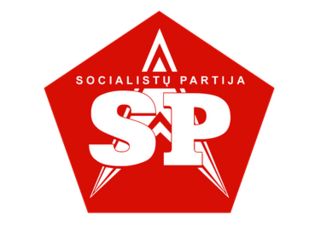
The Socialist Party is a minor left-wing Marxist political association in Lithuania formed on October 21, 2018, from a split of the Socialist People's Front.
















